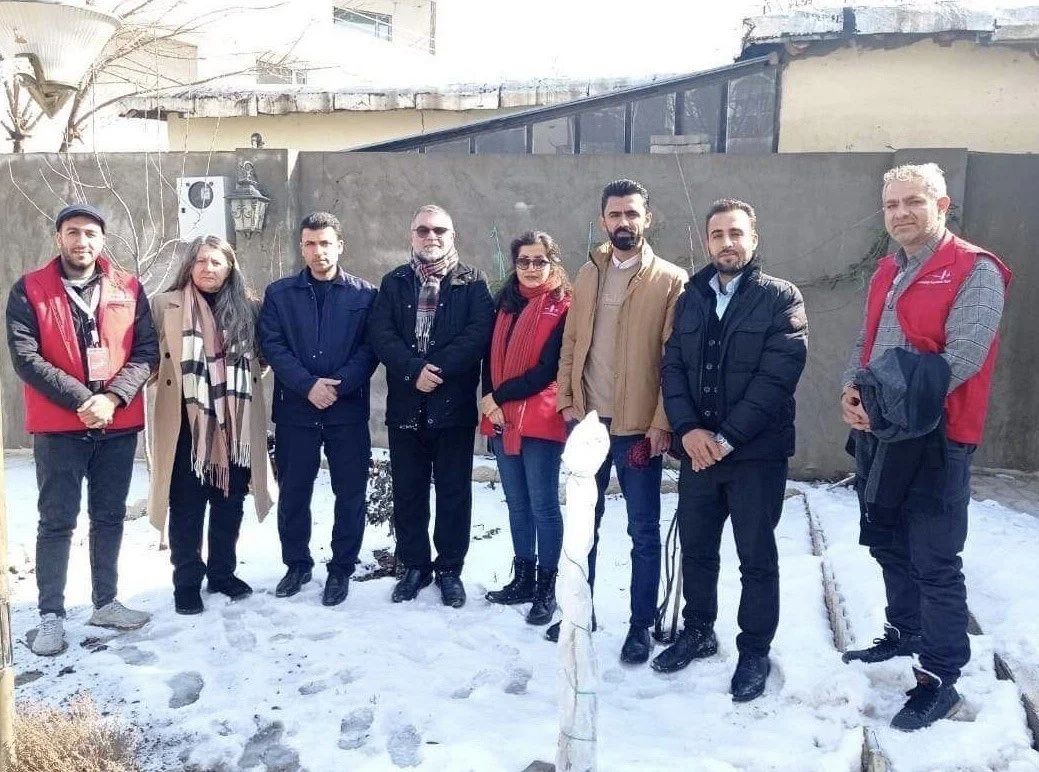Penjwen’s “Breadbasket" Became a Symbol of Nonviolent Action in Iraqi Kurdistan
by Mohammed Salah
Sharing a warm meal during a protest in Penjwen (photo credit: Facebook page - Penjwen Top)
Penjwen town is located to the east of Slemani, on the border with Iran. It has a population of about 55,000 people. Surrounded by high mountains, Penjwen in winter becomes the coldest town in all of Iraq. Due to the presence of a major international border crossing with Iran, Penjwen is the main source of income for the Kurdistan Regional Government (KRG). As the soil of the area is fertile for agriculture, Penjwen is called by its people “The breadbasket of Iraq and Kurdistan.”
In the past, the KRG used to provide 24/7 electricity to this town, especially in winter, so that people could survive when the temperatures were dropping to -10, or even -20, degrees Celsius. Kerosene is another resource that people use to fulfill their needs. Each family uses at least 3-4 barrels (of 200 liters each) of kerosene per year for heating, and this year each family has received only one barrel of kerosene from the government so far. In addition, the Ministry of Electricity reduced the electricity for the town from 24 to 20 hours per day.
The people and the mayor of Penjwen have repeatedly asked the government to provide enough kerosene and electricity in order to survive this year’s winter cold, however, the government failed the people by not listening to their demands.
Blockaded trucks on the Penjwen road
With much courage and determination, civil activists and common people of Penjwen organized themselves and took action against the ignorance of their government. On 11 January 2023, thousands of people blockaded the main highway that passes through their town. They stopped the movement of all trucks carrying goods, oil and other supplies on the way to and from the international border crossing. Protesters set up tents on the road and stayed there peacefully and calmly for five days and nights while it snowed in the town. In solidarity with the protesters, all shops and businesses in the town shut down. With the support of wealthy people, the restaurants cooked three meals a day for protesters and also truck drivers.
Activists and parliamentarians from other cities and towns of Kurdistan came to visit the protesters to express their solidarity. Local media were covering and reporting on the nonviolent action. On the third day of the blockade, the town mayor Mr. Zana joined the protesters and publicly announced that he was resigning from his position in solidarity with them. On the fifth day of the protest, members of Community Peacemaker Teams and the Federation of Civil Society Organizations, which represents 15 NGOs, organized a delegation and visited the protesters and the mayor of the town.
The delegation met with the organizers of the blockade and spoke in front of the protesters to express their solidarity and gratitude for their peaceful and nonviolent action. One of the protesters, Hawre, told members of the delegation, “Everyone from Penjwen despite our differences takes part in this demonstration and we collaborate with each other with compassion. Our goal is to bring 24/7 electricity back to the town and each family should get more kerosene. Each night, nearly 100 protesters are staying under the tents in this cold weather.”
Inspired by the protesters’ commitment, members of the delegation left the crowd to visit the mayor in his house. Mr. Zana welcomed the delegation warmly and with much respect and shared about the importance of his town for the whole country. He also expressed his appreciation for the unity of the townspeople as they stayed on the streets peacefully, demanding their rights. “People are just asking for their basic rights,” he stated. “We are dealing with the lack of basic services in this town, for instance, until now, there are 52 million square meters of landmines that have not been cleared after the war between Iraq and Iran in the eighties. This town has been demolished three times during that war, people of Penjwen deserve to be served much better than now.”
With hope the mayor shared that the governor of Slemani told him on the phone in the morning that the government had decided to provide 24/7 electricity to the town and that each family would receive another barrel of kerosene. “The governor asked me to rejoin my office, but I will not,” the mayor added. Hawre, who joined the delegation’s meeting with the mayor, told Mr. Zana, “We are protesting to achieve our goal and it seems we are achieving our goals. Now we are worried about losing you as the mayor of our town and we do not want this. Please do not resign.”
After receiving the good news, the protesters ended their blockade and opened the highway for the trucks. Then the protesters marched, carrying their tents, towards the mayor’s house. They asked the mayor to withdraw his resignation and rejoin his office. They were ready to continue their protest in front of the mayor’s house until he returned to his office. After much pressure from the people, the mayor joined the protesters and together they marched to the mayor's office.
Delegation members from Community Peacemaker Teams and the Federation of Civil Society Organizations felt honored and inspired to witness this powerful nonviolent direct action of the people of Penjwen. Now, Penjwen is not only the breadbasket of the country. Penjwen became a symbol of nonviolent direct action for all of Iraq. It is the first time in the history of activism in this country that protesters within just five days were able to achieve their goal through nonviolence and without anyone getting hurt or any property damage.




